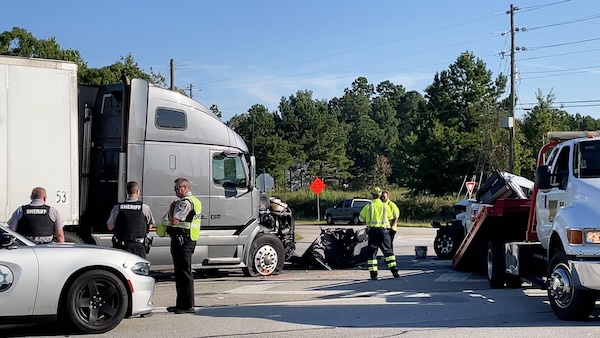Is Georgia an At-Fault State? Understanding Car Accident Liability and Insurance Claims
When it comes to car accidents and insurance claims, understanding the rules that govern fault and liability is essential. Drivers often encounter the terms “at-fault” and “no-fault” in the context of auto insurance, but what do they mean, and how do they apply to states like Georgia? If you’re involved in a car accident in Georgia, knowing how fault is determined and how it impacts insurance claims can save you time, stress, and financial strain.
In this blog, we’ll break down Georgia’s at-fault system for car accidents, insurance requirements, and claims process, while highlighting the critical role an experienced car accident lawyer can play in securing fair compensation.
Georgia is an At-Fault State
Georgia is an at-fault state for car accidents. And in at-fault states similar to Georgia, the insurance company of the driver deemed responsible for the accident must cover the damages. This means that the driver responsible for causing the accident is liable for any damages that result from it.
In such cases, the at-fault driver’s insurance company is responsible for covering the costs associated with the accident, including medical expenses, property damage, and other related claims.
Responsibility of the At-Fault Driver
When an accident occurs, the driver deemed at fault must rely on their insurance coverage to pay for damages. This can involve various types of liability coverage, including:
- Bodily Injury Liability Insurance: Covers medical expenses and other damages for injuries caused to others.
- Property Damage Liability Insurance: Covers the cost of damage to another person’s property.
These coverages help protect the at-fault driver from significant financial loss, as they are designed to cover claims made by the injured parties. Victims can seek compensation from the other driver’s insurance to cover their damages and medical expenses.
The Role of Insurance in an At-Fault State
In an at-fault state like Georgia, the insurance process can be complex. Understanding how liability works is crucial for drivers. If you are involved in an accident, an auto insurance company will only cover damages if fault is established, which plays a significant role in how claims are processed.
Challenges with the At-Fault Driver’s Insurance Company
It is essential to be aware that the other driver’s insurance company will handle compensation claims for damages following a car accident. Injured drivers can seek compensation from the other driver’s insurance company based on the fault determination and the modified comparative negligence model. However, these companies often aim to minimize the payout. This is why understanding your rights and responsibilities in an at-fault state is critical for navigating the aftermath of a car accident.
Establishing Fault in Georgia
Auto insurance claims are crucial to understand, especially when it comes to state laws and the process of filing claims. Proving fault after a car accident in Georgia is essential for securing compensation. Unlike no-fault states, where insurance covers injuries regardless of who caused the accident, Georgia is an at-fault state. This means the driver who is found responsible for the accident is liable for damages.
Process of Proving Fault After a Car Accident
To establish fault, several steps need to be taken. First, gather evidence from the accident scene. This includes taking photographs, collecting witness statements, and obtaining contact information from those involved. Next, a police report is crucial. Officers will document the accident, which can serve as an official account of events. This report often contains important details, such as the conditions of the road and any traffic violations observed.
Importance of Gathering Evidence and Police Reports
The evidence collected is vital in supporting your claim. It helps to clarify how the accident occurred and who was responsible. A police report can also provide an unbiased perspective, which is valuable when dealing with insurance companies. In Georgia, the burden of proof lies with the injured party. Therefore, having solid evidence can significantly impact the outcome of your personal injury claim.
Additionally, if the case goes to court, this evidence will play a critical role in the proceedings. The more comprehensive your documentation, the stronger your case will be. This is why it is advisable to act quickly after an accident to gather as much information as possible. By doing so, you can better navigate the complexities of Georgia’s legal system and enhance your chances of receiving fair compensation for your injuries and damages.
Modified Comparative Fault Rule
In Georgia, the modified comparative fault rule plays a significant role in determining how compensation is awarded after a car accident. This rule allows for the allocation of fault between the involved parties, impacting the amount of damages a victim can recover.
Explanation of the Modified Comparative Fault Rule in Georgia
Under Georgia law, if a driver is found to be partially at fault for an accident, their compensation will be reduced by their percentage of fault. For example, if you are in a car crash and the court determines you are 30% responsible, your total damages will be reduced by that percentage. This means if your damages amount to $100,000, you would only receive $70,000.
This system encourages responsible driving and accountability. It also means that if a driver is found to be 50% or more at fault, they cannot recover any damages at all. Therefore, understanding how fault is assigned is crucial for anyone involved in an accident in Georgia.
Impact on Compensation When a Driver is Partially at Fault
The modified comparative fault rule significantly affects compensation for accident victims. If you are partially responsible for the accident, you need to be prepared for how this will impact your claim.
For instance, if you were speeding at the time of the accident, even if another driver was also negligent, your compensation could be diminished. This can be particularly frustrating for victims who may feel they deserve full compensation despite their role in the incident.
Minimum Insurance Requirements in Georgia
In Georgia, drivers must adhere to specific insurance requirements to legally operate a vehicle. Understanding these minimum insurance standards is essential for all motorists to avoid penalties and ensure they are adequately protected in the event of an accident.
Mandatory Bodily Injury Liability Insurance
Georgia at-fault state law mandates that all drivers carry a minimum of $25,000 in bodily injury liability insurance per person and $50,000 per accident. This coverage is crucial as it helps pay for medical expenses and other damages if you injure another party in a car accident. If you are at fault, your insurance will cover the other driver’s medical bills and lost wages, ensuring they receive compensation for their injuries.
Property Damage Liability Insurance
In addition to bodily injury coverage, Georgia requires drivers to maintain at least $25,000 in property damage liability insurance. This coverage pays for damages to another person’s property, such as their vehicle or any other property damaged in an accident you cause. Meeting this requirement protects you from significant out-of-pocket expenses in the event of an accident.
Importance of Meeting Minimum Insurance Standards
Failing to meet Georgia’s minimum insurance requirements can lead to serious consequences. Drivers caught without the necessary coverage may face fines, license suspension, and even legal action. Moreover, being uninsured or underinsured can leave you vulnerable to financial burdens if you are involved in an accident. Therefore, it is crucial to ensure your insurance policy meets or exceeds Georgia’s minimum requirements to protect yourself and others on the road.
Coverage and Claims Process
When involved in a car accident in Georgia, understanding the claims process is essential. Since Georgia is an at-fault state, the driver who is determined to be at fault is responsible for the damages. This means that if you are not at fault, you can file a claim with the at-fault driver’s insurance company. However, you may also need to deal with your own insurance company for medical costs and other damages, especially in no-fault circumstances or when it’s unclear who is at fault.
Filing a Claim with the At-Fault Driver’s Insurance Company
To initiate a claim, you will need to contact the at-fault driver’s insurance company. Provide them with all necessary information, including:
- Accident details: Date, time, and location of the accident.
- Involved parties: Names and contact information of all drivers and witnesses.
- Police report: A copy of the police report, if available, can strengthen your claim.
- Documentation of damages: Photos of the accident scene, vehicle damage, and any injuries sustained.
The insurance adjuster will review your claim and may contact you for further information. It’s vital to be honest and provide accurate details to avoid complications.
Types of Damages Covered
In Georgia, several types of damages can be claimed following a car accident, including:
- Medical costs: This includes hospital bills, rehabilitation expenses, and ongoing treatment related to injuries from the accident.
- Lost wages: If your injuries prevent you from working, you can seek compensation for lost income during your recovery period.
- Property damage: This covers repairs to your vehicle and any other property damaged in the accident.
- Pain and suffering: You may also claim compensation for emotional distress and pain related to your injuries.
Seek Guidance From an Experienced Georgia Car Accident Attorney Today!
If you’ve been injured in a car accident and need help understanding your rights under an at-fault state like Georgia, our dedicated team at Ross Moore Law is here for you.
Contact us at 404-445-8122 for a free case review today!




